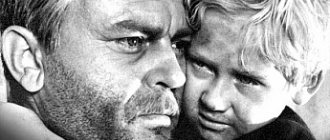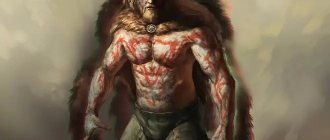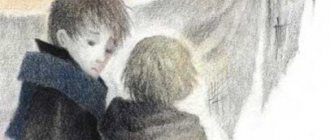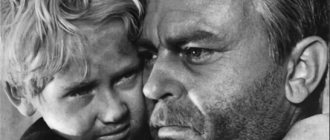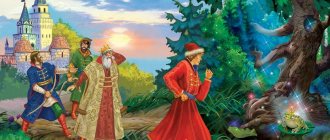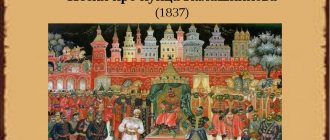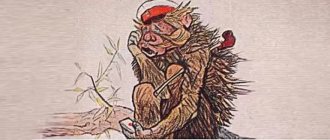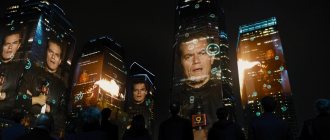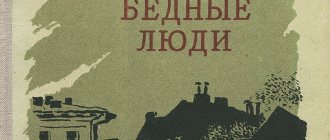1. The behavior of the main character as a reflection of his inner essence. 2. Moral duel. 3. My attitude to the fight between Andrei Sokolov and Muller. In Sholokhov's story “The Fate of a Man” there are many episodes that allow us to better understand the character traits of the main character. One of these moments that deserves our reader’s close attention is the scene of the interrogation of Andrei Sokolov by Muller. By observing the behavior of the main character, we can appreciate the Russian national character, the hallmark of which is pride and self-respect. Prisoner of war Andrei Sokolov, exhausted by hunger and hard work, in the circle of his brothers in misfortune utters a seditious phrase: “They need four cubic meters of production, but for the grave of each of us, one cubic meter through the eyes is enough.” The Germans became aware of this phrase. And then follows the interrogation of the hero. The scene of the interrogation of Andrei Sokolov by Muller is a kind of psychological “duel”. One of the participants in the fight is a weak, emaciated man. The other is well-fed, prosperous, and self-satisfied. And yet, the weak and exhausted won. Andrei Sokolov surpasses the fascist Muller in the strength of his spirit. Refusing the offer to drink German weapons to the victory shows the inner strength of Andrei Sokolov. “So that I, a Russian soldier, would drink German weapons for the victory?!” The very thought of this seemed blasphemous to Andrei Sokolov. Andrei agrees to Muller's offer to drink to his death. “What did I have to lose? - he later recalls. “I will drink to my death and deliverance from torment.” In the moral duel between Muller and Sokolov, the latter wins also because he is afraid of absolutely nothing. Andrey has nothing to lose, he has already mentally said goodbye to life. He openly mocks those who are currently in power and have a significant advantage. “I wanted to show them, the damned one, that although I was disappearing from hunger, I was not going to choke on their handouts, that I had my own, Russian dignity and pride, and that they did not turn me into a beast, no matter how hard they tried.” The Nazis appreciated Andrei’s fortitude. The commandant told him: “That's it, Sokolov, you are a real Russian soldier. You are a brave soldier. “I am also a soldier and I respect worthy opponents.” I think that the scene of the interrogation of Andrei Sokolov by Mueller showed the Germans all the endurance, national pride, dignity and self-respect of the Russian person. This was a good lesson for the Nazis. The unbending will to live, which distinguishes the Russian people, made it possible to win the war, despite the technical superiority of the enemy. During the Great Patriotic War, Sholokhov, in military correspondence, essays, and the story “The Science of Hate,” exposed the anti-human nature of the war unleashed by the Nazis, revealed the heroism of the Soviet people and love for the Motherland. And in the novel “They Fought for the Motherland,” the Russian national character was deeply revealed, clearly manifested in the days of difficult trials. Recalling how during the war the Nazis mockingly called the Soviet soldier “Russian Ivan,” Sholokhov wrote in one of his articles: “The symbolic Russian Ivan is this: a man dressed in a gray overcoat, who without hesitation gave away the last piece of bread and the front-line thirty grams of sugar to a child orphaned during the terrible days of the war, a man who selflessly covered his comrade with his body, saving him from inevitable death, a man who, gritting his teeth, endured and will endure all the hardships and hardships, going to the feat in the name of the Motherland.”
Andrei Sokolov appears before us as such a modest, ordinary warrior in the story “The Fate of a Man.” Sokolov talks about his courageous actions as if it were a very ordinary matter. He bravely performed his military duty at the front. Near Lozovenki he was tasked with transporting shells to the battery. “We had to hurry, because the battle was approaching us...” says Sokolov. “The commander of our unit asks: “Will you get through, Sokolov?” And there was nothing to ask here. My comrades may be dying there, but I’ll be sick here? What a conversation! - I answer him. “I have to get through and that’s it!” In this episode, Sholokhov noticed the main feature of the hero - a sense of camaraderie, the ability to think about others more than about oneself. But, stunned by the explosion of a shell, he woke up already in captivity of the Germans. He watches with pain as the advancing German troops march to the east. Having learned what enemy captivity is, Andrei says with a bitter sigh, turning to his interlocutor:
“Oh, brother, it’s not an easy thing to understand that you are not in captivity of your own free will. Anyone who has not experienced this on their own skin will not immediately penetrate into their soul so that they can understand in a human way what this thing means.” His bitter memories speak of what he had to endure in captivity: “It’s hard for me, brother, to remember, and even harder to talk about what I experienced in captivity. When you remember the inhuman torment that you had to endure there in Germany, when you remember all the friends and comrades who died, tortured there in the camps, your heart is no longer in your chest, but in your throat, and it becomes difficult to breathe...”
While in captivity, Andrei Sokolov exerted all his strength to preserve the person within himself, and not to exchange “Russian dignity and pride” for any relief in fate. One of the most striking scenes in the story is the interrogation of the captured Soviet soldier Andrei Sokolov by the professional killer and sadist Muller. When Müller was informed that Andrei had allowed his dissatisfaction with hard labor to show, he summoned him to the commandant’s office for questioning. Andrei knew that he was going to his death, but decided to “gather his courage to look into the hole of the pistol fearlessly, as befits a soldier, so that his enemies would not see at the last minute that it was difficult for him to part with his life...”
The interrogation scene turns into a spiritual duel between the Captured Soldier and the camp commandant, Müller. It would seem that the forces of superiority should be on the side of the well-fed, endowed with the power and opportunity to humiliate and trample the man Muller. Playing with a pistol, he asks Sokolov whether four cubic meters of production is really a lot, and is one enough for a grave? When Sokolov confirms his previously spoken words, Muller offers him a glass of schnapps before the execution: “Before you die, drink, Russian Ivan, to the victory of German weapons.” Sokolov initially refused to drink “for the victory of German weapons,” and then agreed “for his death.” After drinking the first glass, Sokolov refused to take a bite. Then they served him a second one. Only after the third did he bite off a small piece of bread and put the rest on the table. Talking about this, Sokolov says: “I wanted to show them, the damned ones, that although I am perishing from hunger, I am not going to choke on their handouts, that I have my own Russian dignity and pride and that they did not turn me into a beast, no matter how hard we tried."
Sokolov’s courage and endurance amazed the German commandant. He not only let him go, but finally gave him a small loaf of bread and a piece of bacon: “That’s it, Sokolov, you are a real Russian soldier. You are a brave soldier. I am also a soldier and I respect worthy opponents. I won't shoot you. In addition, today our valiant troops reached the Volga and completely captured Stalingrad. This is a great joy for us, and therefore I generously give you life. Go to your block..."
Considering the scene of the interrogation of Andrei Sokolov, we can say that it is one of the compositional peaks of the story. It has its own theme - the spiritual wealth and moral nobility of Soviet people, its own idea: there is no force in the world capable of spiritually breaking a true patriot, making him humiliate himself before the enemy.
Andrei Sokolov has overcome a lot on his way. The national pride and dignity of the Russian Soviet man, endurance, spiritual humanity, insubordination and ineradicable faith in life, in his Motherland, in his people - this is what Sholokhov typified in the truly Russian character of Andrei Sokolov. The author showed the unbending will, courage, and heroism of a simple Russian man, who, in the time of the most difficult trials that befell his Motherland and irreparable personal losses, was able to rise above his personal fate, filled with the deepest drama, and managed to overcome death with life and in the name of life. This is the pathos of the story, its main idea.
The Great Patriotic War, even after many decades, remains the greatest blow for the whole world. What a tragedy this is for the fighting Soviet people, who lost the most people in this bloody battle! The lives of many (both military and civilian) were ruined. Sholokhov's story “The Fate of Man” truthfully depicts these sufferings, not of an individual person, but of the entire people who stood up to defend their Motherland.
The story “The Fate of a Man” is based on real events: M.A. Sholokhov met a man who told him his tragic biography. This story was almost a ready-made plot, but did not immediately turn into a literary work. The writer nurtured his idea for 10 years, but put it on paper in just a few days. And he dedicated it to E. Levitskaya, who helped him publish the main novel of his life, “Quiet Don.”
The story was published in the Pravda newspaper on the eve of the new year, 1957. And soon it was read on All-Union Radio and heard throughout the country. Listeners and readers were shocked by the power and truthfulness of this work, and it gained well-deserved popularity. In literary terms, this book opened up a new way for writers to explore the theme of war - through the fate of a little man.
The essence of the story
The author accidentally meets the main character Andrei Sokolov and his son Vanyushka. During the forced delay at the crossing, the men started talking, and a casual acquaintance told the writer his story. This is what he told him.
Before the war, Andrei lived like everyone else: wife, children, household, work. But then thunder struck, and the hero went to the front, where he served as a driver. One fateful day, Sokolov’s car came under fire and he was shell-shocked. So he was captured.
A group of prisoners was brought to the church for the night, many incidents happened that night: the shooting of a believer who could not desecrate the church (they didn’t even let him out “until the wind”), and with him several people who accidentally fell under machine gun fire, help from a doctor to Sokolov and others wounded. Also, the main character had to strangle another prisoner, since he turned out to be a traitor and was going to hand over the commissioner. Even during the next transfer to the concentration camp, Andrei tried to escape, but was caught by dogs, who stripped him of his last clothes and bit him so much that “the skin and meat flew into shreds.”
Then the concentration camp: inhuman work, almost starvation, beatings, humiliation - that’s what Sokolov had to endure. “They need four cubic meters of production, but for the grave of each of us, one cubic meter through the eyes is enough!” - Andrei said imprudently. And for this he appeared before Lagerführer Müller. They wanted to shoot the main character, but he overcame his fear, bravely drank three glasses of schnapps to his death, for which he earned respect, a loaf of bread and a piece of lard.
Towards the end of hostilities, Sokolov was appointed driver. And finally, an opportunity arose to escape, and even together with the engineer whom the hero was driving. Before the joy of salvation had time to subside, grief arrived: he learned about the death of his family (a shell hit the house), and all this time he lived only in the hope of a meeting. One son survived. Anatoly also defended his homeland, and Sokolov and he simultaneously approached Berlin from different directions. But right on the day of victory, the last hope was killed. Andrey was left all alone.
Characters
- Andrey Sokolov is the main character of the story, who tells the story of his life. During the war he was a driver. He was captured by the Germans. I was in captivity for 2 years. His name then was “number 331.”
- Anatoly Sokolov is the son of Andrey. Fought; died from a German bullet on Victory Day.
- Nastya and Olya are the daughters of Andrei Sokolov.
- Vanya is the adopted son of Andrei Sokolov.
- Irina Sokolova is Andrei's wife.
- Ivan Timofeevich is Sokolov’s neighbor.
- Kryzhnev is a traitor.
Subjects
The main theme of the story is a man at war. These tragic events are an indicator of personal qualities: in extreme situations, those character traits that are usually hidden are revealed, it is clear who is who in reality. Before the war, Andrei Sokolov was not particularly different; he was like everyone else. But in battle, having survived captivity and constant danger to life, he proved himself. His truly heroic qualities were revealed: patriotism, courage, perseverance, will. On the other hand, a prisoner like Sokolov, probably also no different in ordinary peaceful life, was going to betray his commissar in order to curry favor with the enemy. Thus, the theme of moral choice is also reflected in the work.
Also M.A. Sholokhov touches on the topic of willpower. The war took away from the main character not only his health and strength, but also his entire family. He has no home, how can he continue to live, what to do next, how to find meaning? This question has interested hundreds of thousands of people who have experienced similar losses. And for Sokolov, caring for the boy Vanyushka, who was also left without a home and family, became a new meaning. And for his sake, for the sake of the future of his country, you need to live on. Here is the disclosure of the theme of the search for the meaning of life - a real person finds it in love and hope for the future.
Chapter 2. Life before the war
“At the beginning, my life was very ordinary,” said the stranger. “When the famine of ’22 happened, I decided to go to Kuban to work for the kulaks - this is the only factor that allowed me to stay alive. But my father, mother, and sister stayed at home and died because of the hunger strike. I was left completely alone, no relatives. A year later I decided to return from Kuban, sold the house, and went to Voronezh. At first he worked as a carpenter, after which he went to a factory and decided to train as a mechanic. Then he got married. My wife is an orphan and grew up in an orphanage. Cheerful, but at the same time modest, smart - not at all like me. From childhood she already knew how hard life was, and this was noticeably reflected in her character. From the outside, it’s not that noticeable, but I looked straight ahead. And there was no woman more beautiful, smarter, more desirable for me, and now there never will be.”
“Another time I come home from work - tired, sometimes and terribly angry. But she was never rude to me in response - even if I was rude. Calm and affectionate, she did everything to prepare me a delicious piece of bread with minimal income. I looked at her - and I felt my heart melting, and all my anger evaporating somewhere. I’ll walk away a little, come up, and start asking for forgiveness: “Sorry, my affectionate Irinka, I was rude. I didn’t get along with my work today, you know?” “And again we have peace, comfort, and I feel good in my soul.”
Then Sokolov again talked about his wife, about how she loved him immensely and never reproached him, even if he had to drink too much somewhere with friends. Then the children came - a son, after him two daughters. After the birth of children, drinking was over, except for one cup of beer on a Sunday. They lived well and rebuilt their house.
In 1929 he became interested in cars. That's how I became a truck driver. And everything would be fine, but the war began. A summons arrived and they were soon taken to the front.
Issues
- The problem of choice occupies an important place in the story. Every person faces a choice every day. But not everyone has to choose on pain of death, knowing that your fate depends on this decision. So, Andrei had to decide: to betray or remain faithful to the oath, to bend under the blows of the enemy or to fight. Sokolov was able to remain a worthy person and citizen because he determined his priorities, guided by honor and morality, and not by the instinct of self-preservation, fear or meanness.
- The whole fate of the hero, in his life trials, reflects the problem of the defenselessness of the common man in the face of war. Little depends on him; circumstances are falling on him, from which he is trying to get out at least alive. And if Andrei was able to save himself, then his family was not. And he feels guilty about it, even though he isn't.
- The problem of cowardice is realized in the work through secondary characters. The image of a traitor who, for the sake of immediate gain, is ready to sacrifice the life of a fellow soldier, becomes a counterweight to the image of the brave and strong-willed Sokolov. And there were such people in the war, says the author, but there were fewer of them, that’s the only reason we won.
- The tragedy of war. Numerous losses were suffered not only by the military units, but also by civilians who could not defend themselves in any way.
Episodes most important for revealing the character of Andrei Sokolov “The Fate of a Man”
Today in class we continued to study Sholokhov’s work and looked at his epic story called The Fate of a Man. Getting acquainted with the story, we returned to the tragic events that took place in our country, namely, we returned to the years of the Great Patriotic War. In our work, we follow the fate of Andrei Sokolov. At the same time, describing his fate, the author described the fate of the entire people who survived the war. A people who revealed all their strengths in their character, which were revealed during a difficult period of life.
After reading Sholokhov's work, we can identify the main character, giving him a full description. Now we can describe the character of Andrei Sokolov from the story The Fate of a Man, highlighting individual episodes from the hero’s life that most clearly reveal the fate and image of the character.
As you already understand, the main character of Sholokhov’s work is Andrei Sokolov - an ordinary Russian hard worker who had a wife, children, that is, a full-fledged family. There was a roof over my head, ordinary everyday life. In all this he saw his happiness, and in his family he saw the meaning of life. But the war came and changed everything.
The character of Andrei Sokolov in the story The Fate of a Man
The hero faced real trials in captivity. However, Andrei did not break; he remained to the end a true patriot of his country, strong, brave and courageous. I very much remembered the episode when reading the story about how he could not close his eyes to betrayal. Knowing that one of the soldiers is going to betray his commander and hand him over to his enemies, he goes for the kill. This episode shows the hero's willpower, his justice. It is impossible not to note the episode when Andrei Sokolov received a loaf of bread and a piece of lard. He did not eat everything on his own, but in a comradely manner he divided each piece of food among the other prisoners. This speaks of his concern for his neighbor, of his generous soul.
I also remember his escape episode, where Sokolov shows himself brave and courageous.
However, it was not captivity that became the greatest test for him. He withstood it, just as he withstood other news. He learned that the war had taken not only his home, but also the lives of his relatives, his wife and son. She took away the meaning of his life.
His soul is devastated. He returns from the war to places where no one is waiting for him and this pain cannot be fully felt. We can only imagine it. Sokolov no longer lives, but exists. He goes to work and starts drinking. However, he did not drink himself to death, as often happened. I found the strength not to fall face first into the dirt. Reading the work, we see the hero, despite everything, has not become hardened. He met a boy whom the war also made an orphan. Andrey takes the boy into his care and this speaks of his humane nature, his warmth and kindness. Now he has a new meaning in life - to raise this little man worthy of the future for which he shed his blood during the war.
Characteristics of the main characters
- Andrei Sokolov is an ordinary person, one of many who had to leave their peaceful existence in order to defend their homeland. He exchanges a simple and happy life for the dangers of war, without even imagining how he can remain on the sidelines. In extreme circumstances, he maintains spiritual nobility, shows willpower and perseverance. Under the blows of fate, he managed not to break. And find a new meaning in life, which reveals his kindness and responsiveness, because he sheltered an orphan.
- Vanyushka is a lonely boy who has to spend the night wherever he can. His mother was killed during the evacuation, his father at the front. Tattered, dusty, covered in watermelon juice - this is how he appeared before Sokolov. And Andrei could not leave the child, he introduced himself as his father, giving both himself and him a chance for a further normal life.
Summary
The first post-war spring has arrived. The roads were washed away by the thaw. The narrator needed to get to the other side. They promised to send the boat in two hours. At this time, a man with a little boy approached the crossing. The man (it was Andrei Sokolov) and the narrator started talking.
Before the war
While still young, Andrei went to Kuban to work. And at this time there was famine in Voronezh, and all of Andrei’s relatives died.
Returning to Voronezh, Andrei sold his parents' house and married Irina, an orphan. They had a son, Anatoly, and then two daughters, Olya and Nastya. They lived well: Andrei stopped drinking with friends, he kept striving to go home, to his wife and children. Ten years passed like this. And then - war. Sokolov receives a summons, and he goes to the front.
War
The family sees off Andrey. Irina has a bad feeling.
At the front, Andrei becomes a driver and supplies ammunition. After some time, he is captured by the Germans. The prisoners are examined by a doctor. He sets Sokolov's dislocated arm. At night the prisoners are locked in the temple. They are not allowed out to relieve themselves, and those who, for religious reasons, cannot relieve their natural needs in church are shot.
The prisoners are talking among themselves. Sokolov accidentally overhears one man (later it turns out that this is Kryzhnev) threatening to inform the Germans that his comrade is not just a private, but a communist. Andrei Sokolov is filled with hatred of the traitor and kills him.
Captivity
Once in the camp, Andrei Sokolov immediately planned an escape. When he finally fled, police dogs were set in his tracks. The dogs bit Sokolov, and the Germans sent him to a punishment cell for a month.
After serving his sentence, Sokolov was sent to do hard work in a stone quarry. Once Andrei said in his heart that such work is worse than a grave. There was also a traitor in the camp, and he informed the Germans. Sokolov should have been shot.
Mocking him, Herr Müller invited Andrei to drink before his death for the victory of the Germans and have a proper snack (it is clear that the prisoners were constantly hungry and exhausted). Sokolov rejected this proposal. Then Muller invited Andrei to drink to his death. Andrei Sokolov drank, but did not touch the snack. They poured him a second glass. Sokolov drank again, but did not have a snack: he said that even after the second glass he was not used to snacking. The Germans were very amused by this. Sokolov was left alive - and they even gave him a loaf of bread and a piece of lard. He subsequently shared the food with other prisoners.
Escape
1944 Germany is gradually losing ground. Andrei Sokolov is still in captivity.
The Germans learned that Sokolov was the driver. He was made the personal driver of one major. Sokolov began to prepare for escape: he somehow took off the uniform of a drunken German, then hid the weight. And when the non-commissioned officer wanted to go out of town, Sokolov carried out his plan: he stunned the German with a weight, dropped him off, and he changed into German clothes and rushed to the front in a car.
He was greeted joyfully and was even given a month of rest to see his family. Sokolov wrote to his wife. The answer came two weeks later, but not from Irina, but from a neighbor. Terrible news: his wife and both daughters died, their house was destroyed, and in its place there was a pit with rusty water.
Son
Sokolov really missed his wife and daughters. His entire world was made up of his son Anatoly. He and Anatoly began to correspond, and Andrei learned that his son was a division commander. The elder Sokolov imagined how the war would end, and he and Anatoly would live together - Andrey would babysit his grandchildren...
On May 9 the war ended. But the Victory brought Andrei Sokolov not only joy: on May 9, a German sniper killed his son Tolya. The world has collapsed.
Life after the war
Sokolov could not return to Voronezh - he went to visit a friend in Uryupinsk. There he got a job as a driver. He picked up and adopted a five-year-old street child, Vanyushka. The boy fell in love with Andrei very much, and would never agree to stay at home without him, so the two of them went on every flight together.
Recently, however, something bad happened: the car skidded and Andrei hit a cow. The cow was not injured, but Sokolov was deprived of his driver's license. He found a new job in Kashar and is now traveling there with his son. Everything would be fine, but my heart is naughty and tormented by memories of my wife, daughters, and son.
The boat arrived, and Andrei Sokolov said goodbye. Vanyushka also waved goodbye to the lyrical hero.
What is the meaning of the work?
One of the main ideas of the story is the need to take into account the lessons of the war. The example of Andrei Sokolov shows not what war can do to a person, but what it can do to all of humanity. Prisoners tortured in concentration camps, orphaned children, destroyed families, scorched fields - this should never be repeated, and therefore should not be forgotten.
No less important is the idea that in any, even the most terrible situation, one must remain human and not become like an animal that, out of fear, acts only on the basis of instincts. Survival is the main thing for anyone, but if this comes at the cost of betraying oneself, one’s comrades, one’s Motherland, then the surviving soldier is no longer a person, he is not worthy of this title. Sokolov did not betray his ideals, did not break, although he went through something that is difficult for a modern reader to even imagine.
Genre
A short story is a short literary genre that reveals one storyline and several characters. “The Fate of Man” refers specifically to him.
However, if you take a closer look at the composition of the work, you can clarify the general definition, because this is a story within a story. First, the story is narrated by the author, who, by the will of fate, met and talked with his character. Andrei Sokolov himself describes his difficult life; the first-person narration allows readers to better understand the hero’s feelings and understand him. The author's remarks are introduced to characterize the hero from the outside (“eyes, as if sprinkled with ashes,” “I didn’t see a single tear in his seemingly dead, extinct eyes... only his large, limply lowered hands trembled slightly, his chin trembled, his hard lips trembled”) and show how deeply this strong man suffers.
History of creation
Sholokhov wrote the story “The Fate of a Man” very quickly, literally in a few days. It was based on the story of a casual acquaintance of Mikhail Alexandrovich. The writer subsequently very much regretted that he did not recognize the name of the person who told him this story.
Perhaps the story of the unknown traveler would never have become a literary work: ten years passed from the moment of the meeting to the writing of “The Fate of Man.”
So, years passed, Sholokhov read Remarque and Hemingway. And the writer was very embarrassed by the enduring image of a person that he could observe in foreign writers - a doomed, weak person. The writer wanted to somehow challenge this judgment - and his answer was “The Fate of Man.”
The story was published and read on the radio. And the response that “The Fate of Man” received from listeners cannot be compared with anything. Sholokhov received hundreds of thousands of letters. People told the writer about their fate - the fate of a person. And although there was no physical opportunity to respond to all these letters, such unprecedented responsiveness of the people made a huge impression on the writer.
Issues:
- man and war;
- fate and homeland;
- moral choice (killing to avoid betrayal; behavior in captivity: not to collude with the enemy, not to betray comrades, to endure all the torments in order to remain human).
The meaning of the title: the title of the story allows us to reach the level of maximum, almost cosmic, generalization. Andrei Sokolov is an ordinary Russian person, and at the same time, a Man with a capital letter.
Literary direction: realism.
Literary genre: story.
Genre features: unfortunately, standard definitions do not allow us to call “The Fate of a Man” an epic story, although such a definition would be perfectly suited for a story that contains a person’s entire life and reveals a panoramic picture of the life of the Russian people. Researchers call “The Fate of Man” a panoramic story.
It is also necessary to pay attention to the fact that Sholokhov uses the composition of a story within a story: the lyrical hero - the author - appears only at the beginning and at the end of the story. The main narration belongs to Andrei Sokolov.
Time and place of action: Andrei Sokolov tells his story to the author in the first post-war spring. Its history itself describes the times of the Great Patriotic War.
